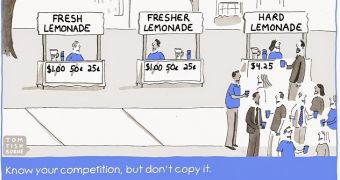Google’s Eric Schmidt says that in business, it is important not to copy others, but to always be aware of what your competitors are doing.
“Playing catch-up with the competition can only ever help you make incremental gains. It will never help you create something new. It’s important to understand what’s going on around you, but the best way to stay ahead is a laser focus on building great products that people need,” Schmidt wrote on his Google+ page.
He also added a picture with the caption #HowGoogleWorks illustrating two stands selling “fresh lemonade” and “fresher lemonade” and another one that was attracting all the customers, where “hard lemonade” was being sold. The caption below the picture reads “Know your competition. Don’t copy it.”
This obviously shows that Google’s Executive Chairman Eric Schmidt does not believe Google is a copier, seeing the company as an innovator, an entity that seeks to put humanity and its needs at the forefront.
The reality isn’t necessarily as pink as the Google exec wants us to believe it is. While Google hasn’t exactly copied 100 percent of other people’s products, it has at least taken great inspiration from them.
Google+, for instance, is not like other social networks out there, but that doesn’t mean it doesn’t share features with other similar tools. The service is a result of Google’s desire to be a part of the social network madness which reached a high point with Facebook and Twitter, but the lack of success of Google+ pushed the company into turning the platform into something different – the backbone of its product universe.
While Google’s search engine is most often than not better than other similar tools, it’s not exactly innovative and neither are other tools and products designed by the company.
In fact, many of its most famous tools aren’t even born in Google’s headquarters. YouTube and Android are two really good examples of products that other people came up with, where Google saw potential and decided to make an offer. Their bets paid off, of course and the same will likely happen to many other companies Google acquired, including Nest, Waze and the army of robot-developing companies, combined with the AI ones.
This doesn’t mean that Google doesn’t have the potential and the power to actually come up with innovative solutions to many problems. Chances are quite high that these ideas will come from the now-famous Google X labs, the same place that gave us Glass, Project Loon and the driverless cars.

 14 DAY TRIAL //
14 DAY TRIAL //